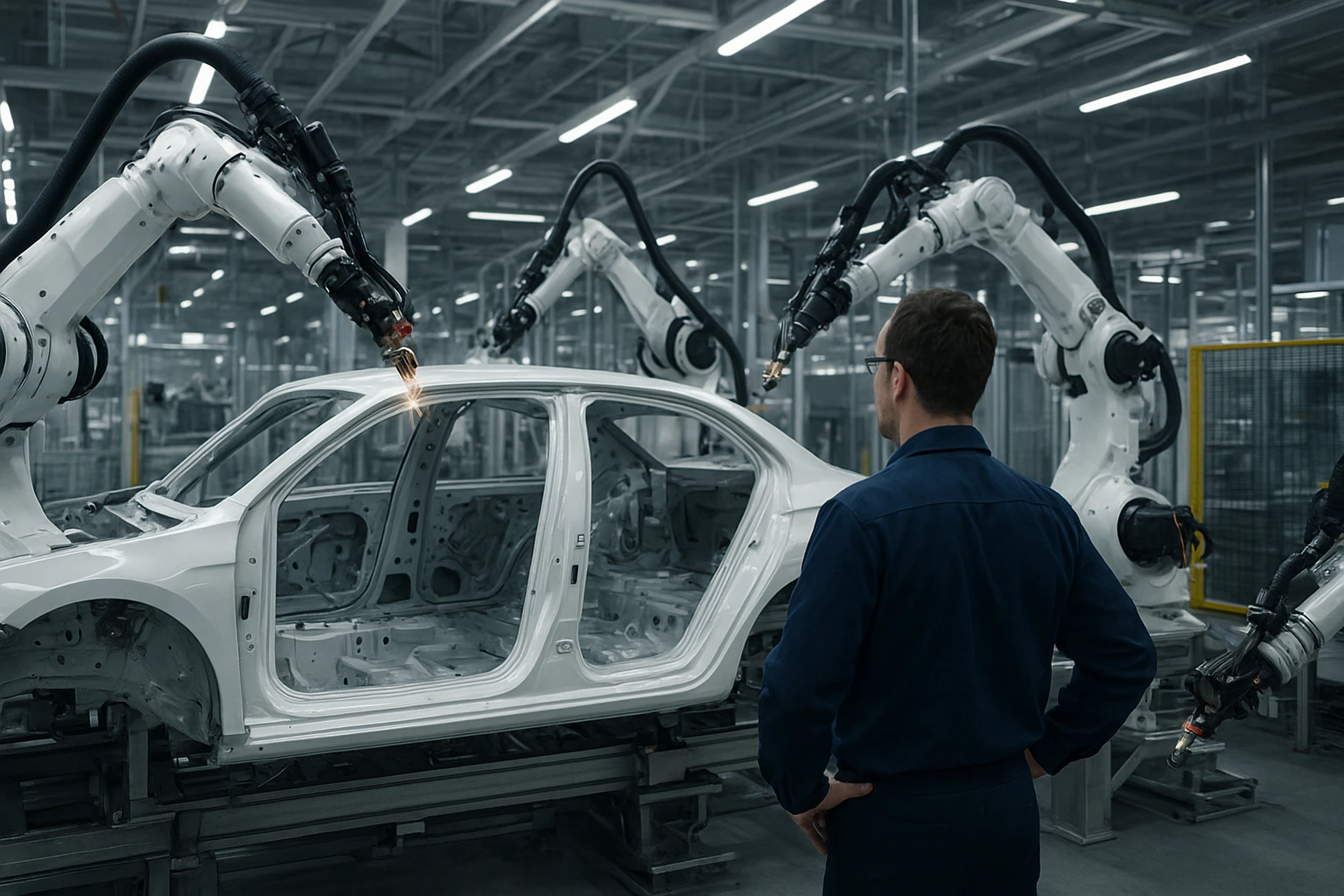WOLFSBURG, Germany (TECHY QUANTUM) — German automaker Volkswagen warned Wednesday that temporary production stoppages could occur in the coming weeks as China’s export restrictions on chips made by Nexperia disrupt Europe’s already fragile semiconductor supply chain.
Volkswagen AG said its production remains unaffected for now but acknowledged that “short term effects on production cannot be ruled out.”
The warning follows mounting concerns that a China Netherlands trade dispute involving Nexperia, a Dutch based but Chinese owned semiconductor manufacturer, could impact European carmakers dependent on its components.
The German Association of the Automotive Industry earlier cautioned that the escalating dispute could lead to “significant production restrictions in the near future” if chip supplies are not restored quickly.
Last month, the Dutch government took control of Nexperia, citing national security concerns that its technologies “could become unavailable in an emergency.” The unusual intervention was seen as a protective move against potential Chinese influence in Europe’s tech infrastructure.
Beijing retaliated by imposing export controls on Nexperia’s finished products, effectively freezing the flow of automotive grade semiconductors to Europe.
The move triggered alarm across the continent’s auto sector, which still remembers the supply chain paralysis during the 2021/22 global chip shortage.
While Volkswagen is not a direct customer of Nexperia, many of its Tier 1 suppliers rely on components containing Nexperia chips, particularly in critical vehicle control systems.
“We are in close contact with all relevant stakeholders in light of the current situation to identify potential risks at an early stage,” a Volkswagen spokesperson said in an emailed statement.
“Although production is currently unaffected, short term effects cannot be ruled out.” Shares of Volkswagen fell nearly two percent in Frankfurt trading following the announcement.
Industry experts say the situation highlights how geopolitical disputes are increasingly shaping industrial outcomes. “This isn’t a technical supply issue it’s geopolitical,” said Dr. Julia Klein, an analyst at AutoIntel Research in Berlin.
“Nexperia produces mature, high volume chips, not advanced AI processors. Yet their absence can halt an entire production line because automakers depend on these small but critical components.”
Thomas Reichert, a supply chain consultant who advises European automakers, added that Volkswagen’s warning is “a proactive but realistic acknowledgment of risk.”
“Even if the parts are low-cost, requalifying alternative chips takes months,” Reichert said. “If this dispute drags on, we could see localized shutdowns in days, not weeks.”
According to figures from the European Semiconductor Observatory, approximately 11 percent of automotive grade analog chips used by German automakers originate from Nexperia’s facilities.
Since China’s restrictions began, average delivery times for these parts have jumped from six to twelve weeks. Market data shows wholesale chip prices rising between five and twenty percent in October alone, according to TrendForce.
Analysts say the European auto sector currently has “three to four weeks” of buffer stock before production delays could begin. “If supply doesn’t normalize by November, we could see the first wave of partial shutdowns,” said Franz Müller, a logistics expert at the University of Munich.
At Volkswagen’s Wolfsburg headquarters, employees expressed cautious concern. “We were told everything is fine for now, but the message sounded like a warning,” said factory worker Jens Koch, who has worked on the assembly line for 12 years. “If one supplier stops delivering a chip, the whole chain can freeze.”
Suppliers, too, are bracing for turbulence. A Munich based electronics manufacturer, who requested anonymity, said it had already received inquiries from Volkswagen and BMW about alternate sourcing. “We’re checking if we can replace Nexperia components, but validation will take time and testing,” the supplier said.
In the Netherlands, residents near Nexperia’s Nijmegen plant said the sudden government intervention had created confusion. “We understand the security concerns, but many people here depend on that plant for their livelihoods,” said local shop owner Mark van Dijk.
Experts believe the next two to three weeks will determine the severity of the fallout. If Beijing relaxes restrictions or the Netherlands negotiates a compromise, production losses could be avoided.
But if the standoff continues, automakers may face a return to reduced hour work schemes similar to those seen during the pandemic era shortages.
Volkswagen said it continues to monitor the situation “on a daily basis” and is exploring contingency measures, including alternative chip suppliers.
Analysts suggest this could accelerate Europe’s efforts to localize semiconductor production under the EU Chips Act, designed to reduce dependence on foreign manufacturers.
“This dispute is another reminder that Europe’s automotive resilience depends on semiconductor sovereignty,” said Klein. “One political decision in Beijing or The Hague can ripple through thousands of factory floors.”
Volkswagen’s warning underscores the fragility of Europe’s post pandemic industrial recovery. As the Nexperia related chip disruption deepens, automakers face renewed pressure to diversify supply chains and reduce exposure to geopolitical flashpoints.
While the company remains operational for now, the episode highlights a growing vulnerability at the intersection of technology and trade one that could again test Europe’s industrial stability if the dispute remains unresolved.
